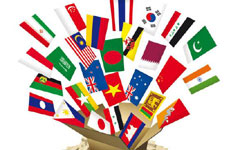The fifth round of Regional Comprehensive Economic Partnership talks are set to commence in Singapore in June, barely two months after the conclusion of the fourth round, a sign that the efforts of 16 Asian countries to create the world's biggest free trade area are gaining momentum. Measures to overcome the challenges in the follow-up negotiations were high on the agenda at the 24th summit of the leaders of the Association of Southeast Asian Nations, and related meetings, which concluded on Sunday.
Comprising the 10 ASEAN member nations as well as China, South Korea, Japan, India, Australia and New Zealand, the RCEP aims to integrate all of ASEAN's existing free-trade agreements into one. Should it be realized it will account for over 30 percent of the world's gross domestic product and cover about 45 percent of the global population. Although intra-regional trade in Asia has almost tripled, to some $3 trillion, over the last decade, it is still lagging behind when compared to the European Union.
 |
 |
The RCEP was first proposed by ASEAN as the regional grouping struggled to entrench its centrality in promoting cooperation with East Asian nations at a time when the United States-led Trans-Pacific Partnership was gearing up. The TPP requires much deeper economic liberalization from its members and contains provisions to protect labor rights, the environment and intellectual property rights, the reform of State-owned enterprises and will boldly eliminate tariffs. By contrast, the RCEP appears to be more inclusive and flexible as it was designed to cater to the diverse circumstances and development gaps that exist within ASEAN and between ASEAN and its FTA partners. This makes it more attractive to less-developed countries and ensures wider membership.
It is anticipated the RCEP will promote income gains of approximately $644 billion by 2025, or 0.6 percent of the world's GDP, according to a study by the Asian Development Bank. The RCEP talks are scheduled for completion in 2015 when agreements will be finalized before being implemented in the following years.
